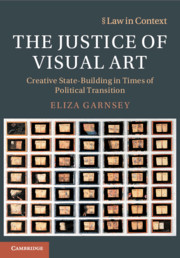Book contents
- The Justice of Visual Art
- The Law in Context Series
- The Justice of Visual Art
- Copyright page
- Dedication
- Contents
- Figures
- Acknowledgements
- Abbreviations
- 1 Introduction
- 2 Art and Justice in Times of Transition
- Part I Recognising Transitional Justice in the Nation State
- Part II Representing Transitional Justice on the Global Stage
- 7 From Banned to Embraced
- 8 Mapping Political Art-Scapes
- 9 The Art of Representation
- 10 The Cultural Diplomacy of Imaginary Fact
- 11 Conclusion
- References
- Index
7 - From Banned to Embraced
from Part II - Representing Transitional Justice on the Global Stage
Published online by Cambridge University Press: 17 October 2019
- The Justice of Visual Art
- The Law in Context Series
- The Justice of Visual Art
- Copyright page
- Dedication
- Contents
- Figures
- Acknowledgements
- Abbreviations
- 1 Introduction
- 2 Art and Justice in Times of Transition
- Part I Recognising Transitional Justice in the Nation State
- Part II Representing Transitional Justice on the Global Stage
- 7 From Banned to Embraced
- 8 Mapping Political Art-Scapes
- 9 The Art of Representation
- 10 The Cultural Diplomacy of Imaginary Fact
- 11 Conclusion
- References
- Index
Summary
Chapter 7, From Banned to Embraced, provides an historical overview of South Africa’s relationship to the International Art Biennale in Venice.In 1968, protests at the Biennale changed how it took place. These changes included banning South Africa from exhibiting: a boycott of the apartheid regime. It was not until 1993, with the prospect of transition from apartheid to democracy, that South Africa was invited back to the Biennale.Through this invitation to exhibit at the Biennale, South Africa was being rewarded for political change.The chapter analyses correspondence between representatives of South Africa and the Biennale in order to chronicle the country’s appearances in the exposition between 1968 and 2013, and to reveal the complex national and international politics and diplomatic negotiations involved in becoming and remaining a member state of the Biennale. I argue that South Africa’s participation continues to be deeply affected by international and national politics; its long absence from the Biennale reverberates through the way in which it represents itself to the international community and establishes itself as a member state of this international organisation.
Keywords
- Type
- Chapter
- Information
- The Justice of Visual ArtCreative State-Building in Times of Political Transition, pp. 129 - 156Publisher: Cambridge University PressPrint publication year: 2019



